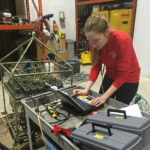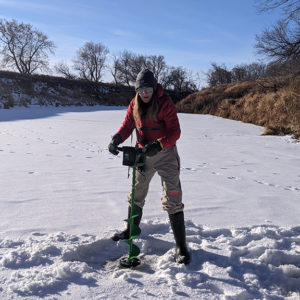Making a career change is never an easy decision. Josh Sleep knew he needed to explore an educational plan that would give him the best option to secure an in-demand full-time career, not just another job. He found what he was looking for with our Computer Systems Technician (CST) program.
Sleep’s initial interest in the program grew through conversations with graduates from the program within the community. “They all mentioned the co-op opportunities and excellent job placement rates after graduation. As a mature student, this greatly appealed to me, as well as the shorter program length of 16 months. This is what originally sold me on the program, but there were many other benefits that I only learned about after enrolling. First off, the size of the Pembroke Campus is much smaller than a larger campus. In some ways, this may be seen as a negative thing, but I saw it as positive. The smaller size of the program in Pembroke means a smaller class size. It was nice to not only know the names of every one of my classmates but it also helped develop a rapport with them, as we knew we were all in this together. The small class size also allowed the teachers to develop personal connections with each student. They did not have three other sets of classes to think about; they were only concerned with the 25 people in our class.”
Sleep also quickly learned that because of the small program size, everyone had their own dedicated equipment to work within the lab. “We were each assigned a workstation with a normal computer and a server which is considered a super-powerful computer. This equipment sat at our desk, and we were the only ones allowed to use it. This encouraged a real sense of ownership with the assignments we were working on.”
“While many of the classes in the CST program focus on building technical knowledge, there are also some classes specifically concerned with job acquisition skills. The program covers all the bases from resume/portfolio building to job interview preparation, to what to look for in prospective employers. Even as a mature student who has had many jobs in the past, there was quite a lot of helpful information provided during the program. At the end of the courses, each student had created a portfolio for themselves. These portfolios contained several documents designed to get us thinking critically about our prospective careers. We wrote resumes, reviewed them with classmates, and rewrote them until they were the best that they could be. We did skill and personality assessments to help us discover ways of leveraging our best skills and traits in future interviews, or which sector of the IT job market would be a good fit. We even completed mock interviews with faculty members who were not our teachers. This was all extremely beneficial as these learning exercises were preparing us for the co-op application and interview process” shares Sleep.
It didn’t immediately occur to Sleep that there was an added benefit to his professors and the role that they played in his career preparation. “It really clicked closer to graduation that most of our instructors were also professionals currently working in the industry. This gave me a lot of confidence that the skills we developed in the CST program were practical, up to date, and in-demand within the job market. As supervisors and company owners, our professors were able to make sure we had the skills that they looked for when hiring for their own businesses.”
Sleep’s co-op preparation paid off when he secured a desk-side support role with the Canada Revenue Agency (CRA) during his paid summer co-op semester. The first day of a new job is nerve-wracking for anyone but Sleep learned very quickly that his team was there to support him. “The team I joined was very welcoming and helpful. They showed me the ropes and introduced me to the systems we would use to complete the required work. Everyone was very friendly, and let me know that they were there to support me with anything I needed.”
Sleep was placed on a team to support client offices that weren’t necessarily CRA operations. His team would support buildings from the Cornwall, Ontario border crossing to the international airport in Iqaluit, Nunavut. This gave him a really unique look at how other government agencies work to protect our country, and made Sleep proud to be able to contribute to the effort. This was also a great way to see the extremely varied positions available within the Canada Revenue Agency.
Sleep not only had the support of his CRA team members, but he also had the continued support of the College. “The co-op support officer from the Pembroke Campus worked hard to ensure that all of the co-op students were enjoying their experience. She would check-in and make sure I was comfortable with the work, and meet with my team lead to ensure I was adequately representing the school. It was a really motivating feeling to know that she could address any concerns that may have come up,” during his co-op experience.
“As a mature student, my career goal going into the CST program was simple: Get one. The program definitely helped a lot with that. Through the co-op and the training provided in the program, I am now at a place where not only do I have a career, but one where I have room to grow in any direction I choose.” By having the opportunity to explore and discuss exactly what he wanted out of his IT career during the program, Sleep felt confident transitioning into his employment. “The instructors exposed us to many different aspects of the IT industry and allowed us to see all the places we could go. The co-op aspect of the program was an excellent foot-in-the-door, and the in-demand skills that we were taught have helped me reach a point where I am able to think about career goals.”
It’s true that sometimes as a student you consider if what you are learning in class is applicable in the “real-world” but it was obvious to Sleep that the skills he acquired would come in handy in his day-to-day work at the Information Technology Branch (ITB) of CRA. “The hardware-specific classes in the first semester were invaluable for my desk-side support position. While it is true that most IT work today is simply replacing parts rather than repairing them, those classes gave me the troubleshooting skills to narrow down which part is causing the problem. Being able to replace a defective part of a computer rather than the computer itself is not only financially responsible but also ecologically responsible. These are two aspects that are very important to the CRA. The network services class gave me some skills I use every day in my current position including directory management and basic networking theory, but it’s the Linux class that has proven to be the most useful as this is something I did not have much exposure to outside of the program, and now it is most of what I do for work.”
When the COVID-19 pandemic hit, the lives of most Canadians were turned upside down. Similar to most, Sleep started to work from home. His team continued to work to ensure Canadians could access important applications including the Canada Emergency Response Benefit (CERB). “The team I work with maintains the integrity of many government services offered online. Specifically, we ensure communication between the various services and that the application process goes smoothly. We ensure that the applications such as My Account, My Business Account, and CERB have the ability to talk to our backend data stores. This allows the application to confirm your identity and passes you through to the appropriate service within the government network.”
Similar to the CST graduates that Sleep spoke to while considering taking the program, he likes to share two pieces of advice that have stuck with him. Both were offered by his professors who passed them along at the beginning of the first semester. They said “This industry requires you to be learning constantly. Even after graduation, you need a continued interest in technology in general or the specialization that you are looking to work into progress in your career. It is an old joke that as soon as you buy a new computer, it is out of date. That same premise applies to IT knowledge. New developments in both hardware and software occur every day. If you are not always adding to your knowledge and skills, you will be quickly left behind. The instructors really encouraged us to follow this advice by allowing each student to pick the topic for various projects. The second piece of advice was about the importance of soft skills. The IT industry has a stereotypical character of the lone hacker in a basement. People with lots of technical skills, but no social skills. Sometimes technical skill is all you need, but for the vast majority of IT jobs, you will need to work on a team, and for a client. Taking care to interact with people in a friendly, professional, and productive manner could mean the difference between getting a managerial role or staying at an entry-level position.”
The Information Technology Branch of CRA is looking to hire 500 students this year, making now the perfect time to apply to the Computer Systems Technician program and become the ideal candidate for a client service role with ITB/CRA (Source: HR Services, Information Technology Branch, Canada Revenue Agency).
-Josh Sleep, 2017 Computer Systems Technician Graduate





 Constable Kevin Francis is still adjusting to the frigid temperatures and only five hours of sunlight each day, but he is thrilled to have launched his policing career in one of Ontario’s most remote regions. The Pembroke Campus Police Foundations graduate is part of the Nishnawbe-Aski Police Service and is posted in the Northern Ontario Aboriginal community of Sandy Lake, where the winter daily highs are normally -30 Celcius.
Constable Kevin Francis is still adjusting to the frigid temperatures and only five hours of sunlight each day, but he is thrilled to have launched his policing career in one of Ontario’s most remote regions. The Pembroke Campus Police Foundations graduate is part of the Nishnawbe-Aski Police Service and is posted in the Northern Ontario Aboriginal community of Sandy Lake, where the winter daily highs are normally -30 Celcius. The Nishnawbe Aski Police Service mainly focuses on investigating criminal matters such as domestic disputes to weapons infractions. Officers often work with limited resources and backup while serving any of the 34 communities in Northern Ontario. The weather can be brutal in the winter with bitterly cold temperatures and plenty of snow, so officers are equipped with four-wheel drive trucks as many of the roads are made of ice.
The Nishnawbe Aski Police Service mainly focuses on investigating criminal matters such as domestic disputes to weapons infractions. Officers often work with limited resources and backup while serving any of the 34 communities in Northern Ontario. The weather can be brutal in the winter with bitterly cold temperatures and plenty of snow, so officers are equipped with four-wheel drive trucks as many of the roads are made of ice.